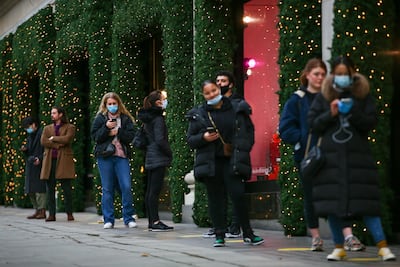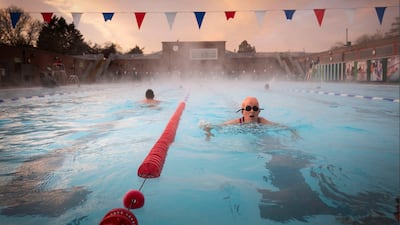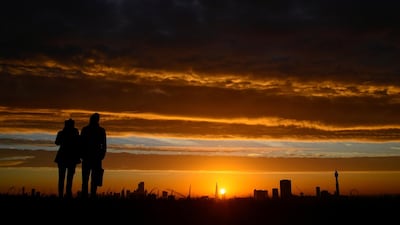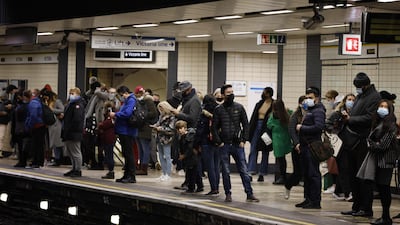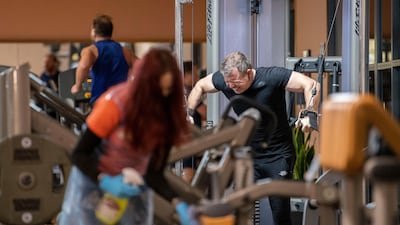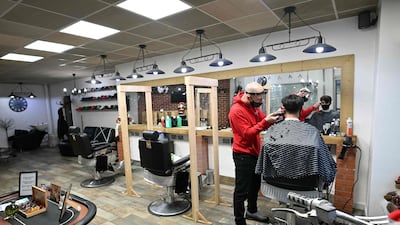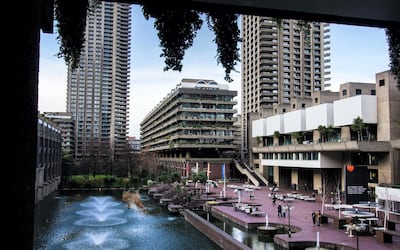The UK came out of lockdown on Wednesday with high street shops and restaurants hoping customers' newfound freedom will set tills ringing.
The day has been called Wild Wednesday after shops were given permission to open 24 hours a day and many slashed prices to start the Christmas rush.
From midnight, 99 per cent of England was placed under Tier 2 or Tier 3 restrictions, effectively banning people from all indoor socialising in other households, apart from over the Christmas period.
So although some semblance of normality has resumed, the tough rules mean many businesses are still under pressure.
In a bitter twist, retailer Debenhams unveiled a 70 per cent fire sale to shift remaining stock after announcing on Tuesday that all of its 124 UK stores are to close.
The collapse of Debenhams put the jobs of 12,000 employees at risk, a day after Philip Green's Arcadia fashion group entered administration, threatening about 13,000 jobs.
Shoppers looking for bargains caused the site to crash on a number of occasions, with the brand introducing a virtual queueing system to cope with demand.
Online shoppers were allowed 30 minutes each to browse for bargains.
“We have been seeing unprecedented levels of visits,” Debenhams said.
Queues were also seen early in the morning at shops such as Primark in Birmingham, where a line of people snaked around the block in the Birmingham Bullring before the outlet’s 7am opening.
Footlocker on London’s Oxford Street was also busy as shoppers queued for bargains before the sun rose.
Restaurateurs on Edgware Road, known as London's "Little Arabia" because of its abundance of Middle East food, were optimistic that life would eventually return to normal but anticipated a long road to economic recovery.
"We've been badly hit," said Tariq Al Wagdadi, owner of Mawlana restaurant on Edgware Road.
"When you try to build a loyal customer base and then you have to close, that creates a real imbalance.
"So we are really building from zero again. We are expecting to make a recovery from the lockdown."
But Mr Al Wagdadi said even reaching 65 per cent of his normal revenue would be "a good result" in the near-term.
December would normally be an extremely busy time for chef Itamar Srulovich, who runs the Middle East restaurant Honey & Co with his wife.
Honey & Co has managed to continue through lockdown in some form, through takeaways or its deli.
But Mr Srulovich said it would never quite compare to the excitement of having customers enjoying his food in the restaurant.
“It’s going to be really good to have people coming back, just to see people and have that interaction,” he said.
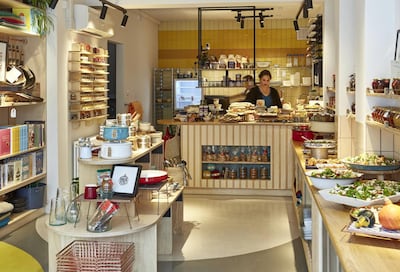
The retail sector is keen to keep shops open for longer, to claw back the heavy losses that have mounted since the start of the lockdown.
But these images below from 2019 show just how much of a boost is needed to get back to normal numbers of customers.
Packed pavements with barely any room to breathe, let alone move, are the typical sight leading up to Christmas.
But a three-week lockdown has ruined the shopping experience. Pictures taken last week show just how empty the capital’s premier shopping streets were.
Whether shoppers rush back to fill those streets again is yet to be seen.
The weather forecast for this weekend does not bode well. Snow and heavy showers will hardly encourage people to leave their armchairs.
“For many retail sectors, particularly those with less of an online presence, conditions remain extremely challenging," said the Confederation of British Industries' principal economist, Ben Jones.
“Retailers will be looking to salvage what they can from a very difficult year and many will be greatly relieved by the announcement that they can reopen over the crucial Christmas trading period.”
Shops are even lowering prices to lure more shoppers and clear stock, with discounts more common at fashion and DIY stores, the British Retail Consortium’s Shop Price Index shows.
It found the price of goods, excluding food, fell 3.7 per cent in November, while market researchers at Mintel and Springboard are expecting similar falls this month.
Others businesses are hoping to get back on their feet swiftly.
Barely two months after reopening its doors to the public, Barbican Cinema was forced to close again in the heart of London in early November, when the second Covid-19 lockdown restricted citizens to their homes.
It came at an awful time for Gali Gold, the head of cinema at the Barbican Centre, who had a full November in store.
Having gone through time-consuming but necessary planning to ensure the venue was Covid-safe, with audiences restricted to about 20 per cent capacity, the lights went out again.
But this week the cinema reopens, with I Still Hide to Smoke, a debut feature by Algerian director Rayhana Obermeyer, to be shown on December 8.
The shackles are not quite off yet. Restrictions on mixing remain but it means Ms Gold gets to see what she wants: viewers in the cinema engaging with films.
The Barbican has adapted to online but she says it will never be the same experience.
“It is vital for what we do," Ms Gold said. "For us it’s like keeping the flame burning until we can have more people.
"Being open, whatever the capacity, allows people to come in and engage."
The global cinema industry has collapsed during the pandemic, with the world’s second-largest cinema operator, Cineworld, forced to shut its 660 theatres in the US and UK in October.
But there were signs that independent cinemas were starting to recover in the autumn before the new lockdown.
For Ms Gold, the new restrictions ordered last month meant the annual Palestinian Film Festival that was due to be shown at the Barbican moved online.
But now that the cinema can reopen, it means that despite the complications and readjustments needed to make the venue Covid-friendly, she will see an audience return.
“We are first and foremost a venue and we are first and foremost a cinema that champions the experience of watching films on a big screen,” Ms Gold said.
“We believe that this is the ultimate experience and there is something about getting together and watching in the company of strangers in a dark, big auditorium.
"No other experience can be comparable with that and the importance for the community to be able to join in that experience is something that really, for us, is the burning conviction that leads us on.”
But uncertainty remains about the long-term future for the arts in the UK, amid criticism of the government for its lack of support.
Even in the short term, cinemas in London will be shut again if it is bumped up from Tier-2 to Tier-3 in the Covid-risk scale.
“It is a very stressful time for everyone," Ms Gold said. "There are immense challenges for the cultural sector, immense ones.
“We really strongly believe that the conviction and the innovation that is coming through the creative and other sectors will get us through it.
“There’s a lot to learn also through the challenges that we all are facing.
"But we really think that the principle values about the importance of keeping culture alive, getting people together, enabling people to elevate their lives through cinema and other artistic experiences is absolutely vital."
